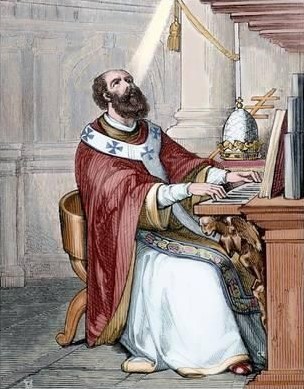July 3, 2021: POPE ST. LEO II
July 3, 2021: ST. LEO II, POPE AND CONFESSOR
Rank: Simple.
O glorious Pontiff, to thee was granted the privilege of completing the Apostolic confession, by giving the furthest development to the testimony rendered by Peter unto the Son of the Living God, who is at the same time, Son of Man.
Prayer (Collect).
O God, who didst render blessed Leo worthy of the rewards of thy saints: mercifully grant that we, who keep his festival, may likewise follow the example of his holy life. Through our Lord Jesus Christ, Thy Son, who liveth and reigneth with Thee, in unity of the Holy Ghost, God, World without end. Amen.
Worthy wast thou to finish the work of a Sylvester, of a Celestine, and of that other Leo, a Pontiff beloved of earth and of heaven. Convoking, inspiring, confirming the illustrious Councils of Nicӕa, Ephesus, and Chalcedon, they had triumphantly proved in our Emmanuel, both His Divinity Consubstantial with the Father, and His Unity of Person, which causes Mary to be truly His Mother, and, furthermore, His twofold Nature, without which He could not have been our Brother.
The holy Liturgy devotes the following lines to the history of this pontificate short indeed but well filled.
Pope Leo the Second was a Sicilian. He was learned in sacred and profane letters, as also in the Greek and Latin tongues, and was moreover an excellent musician. He rearranged and improved the music of the sacred hymns and psalms used in the Church. He approved the acts of the sixth General Council, which was held at Constantinople, under the Presidency of the Legates of the Apostolic See, in the presence of the Emperor Constantine, the patriarchs of Constantinople and Antioch, and one hundred and seventy bishops: Leo also translated these said acts into Latin.
It was in this Council, that Cyrus, Sergius, and Pyrrhus were condemned for teaching that there is in Christ only one Will and one Operation. Leo broke the pride of the Archbishops of Ravenna, who had puffed themselves up, under the power of the Exarchs, to set at naught the power of the Apostolic See. Wherefore, he decreed that the elections of the clergy of Ravenna should be nothing worth, until they had been confirmed by the authority of the Bishop of Rome.
He was a very father to the poor. Not by money only, but by his deeds, his labours, and his advice, he relieved the poverty and loneliness of widows and orphans. He was leading all to live holy and godly lives, not by mere preaching, but by his own life, when he fell asleep in the Lord, having sat as Pope, nine months, and twenty-seven days, and was buried in the Church of Saint Peter, the fourth of the kalends of July. In the month of June, he held one ordination, whereat he ordained nine priests, three deacons, and twenty-three bishops, for divers places.
Another account of Pope St. Leo II.
A.D. 683
He was by birth a Silician, eminent for his piety, and perfectly skilled in the Latin and Greek tongues, in the church music, and both in sacred and polite literature. Pope Agatho dying on the 1st of December, 681, he was chosen to fill the pontifical chair. He confirmed, by the authority of St. Peter, as he says, (writing to the zealous emperor Constantine Pogonatus,) the sixth general council held at Constantinople, in which his predecessor St. Agatho had presided by his legates. In the censure of this council we find the name of Honorius, joined with the Monothelite heretics, Theodorus bishop of Pharan, and Cyrus, Sergius, Pyrrhus, Paul, and Peter of Constantinople. Pope Leo II in his first letter to the bishops of Spain, gives the reason, because Honorius “did not extinguish the flame of the heretical doctrine in its rise, as it became the apostolical authority, but fomented it by negligence.” And in his letter to king Ervigius he makes the same distinction between Honorius and the others. It is evident from the very letters of Honorius himself, which are still extant, from the irrefragable testimony of his secretary who wrote those letters, and from others that he never gave into the Monothelite error; though had he fallen into heresy, this would have only hurt himself; nor is the question of any other importance than as an historical fact. Favourers are sometimes ranked with principals. Honorius had by unwariness, and an indiscreet silence, temporized with a powerful heresy, before his eyes were opened to see the flame which he ought to have laboured strenuously to extinguish when the first sparks appeared. St. Leo reformed the Gregorian chant, composed several sacred hymns for the divine office, and did many things for the advancement of religion, though he was only pope one year and seven months. He pointed out the path to Christian perfection no less by the example of his life, than by his assiduous instructions, and zealous exhortations; and was in a particular manner the father of the poor, whom he diligently relieved, comforted, and instructed with a most edifying tenderness, charity, and patience. He passed to a better life on the 23rd of May, 683, and was buried in the Vatican church on the 28th of June…
Taken from: The Liturgical Year – Time After Pentecost, Vol. III, Dublin, Edition
1890;
The Lives of the Fathers, Martyrs, and Other Principal Saints, Vol. II; and
The Missal for Laity according to the use of the Holy Roman Church, 1846.
Pope St. Leo II, pray for us.
